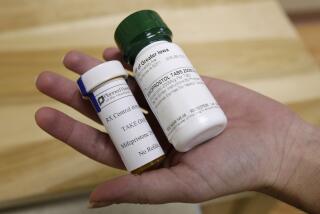High court opens door to more patent challenges
- Share via
The U.S. Supreme Court cleared the way Tuesday for more challenges to patents owned by brand-name drug maker Genentech Inc. and other companies, saying rivals can sue even if they are paying royalties to sell their version of the invention.
The justices, in an 8-1 vote, said Genentech must defend against MedImmune Inc.’s bid to stop making royalty payments on its Synagis respiratory-infection treatment for infants. The majority rejected arguments that MedImmune couldn’t use Genentech’s invention under a licensing agreement while challenging the larger drug company’s patent.
“Promising to pay royalties on patents that have not been held invalid does not amount to a promise not to seek a holding of their invalidity,” Justice Antonin Scalia wrote.
The ruling will have a major effect in the fields of biotechnology and computers, patent experts said. Thousands of patents may now be subject to challenge, and would-be licensees will have new leverage in negotiations with patent holders.
“It’s going to open most licenses to challenges,” said Jim Badke, who specializes in patent litigation involving biotechnology and medical devices at Ropes & Gray in New York. “It’s going to lead to a flood of patent litigation.”
MedImmune argued that it should be able to challenge the Genentech patent without exposing itself to damages or a court block on sales of its product should it lose the case. Synagis generated $624 million in sales, or 84% of the company’s total revenue, in the first nine months of 2006.
Justice Clarence Thomas was the lone dissenter, saying he would have barred the MedImmune suit.
More to Read
Inside the business of entertainment
The Wide Shot brings you news, analysis and insights on everything from streaming wars to production — and what it all means for the future.
You may occasionally receive promotional content from the Los Angeles Times.










